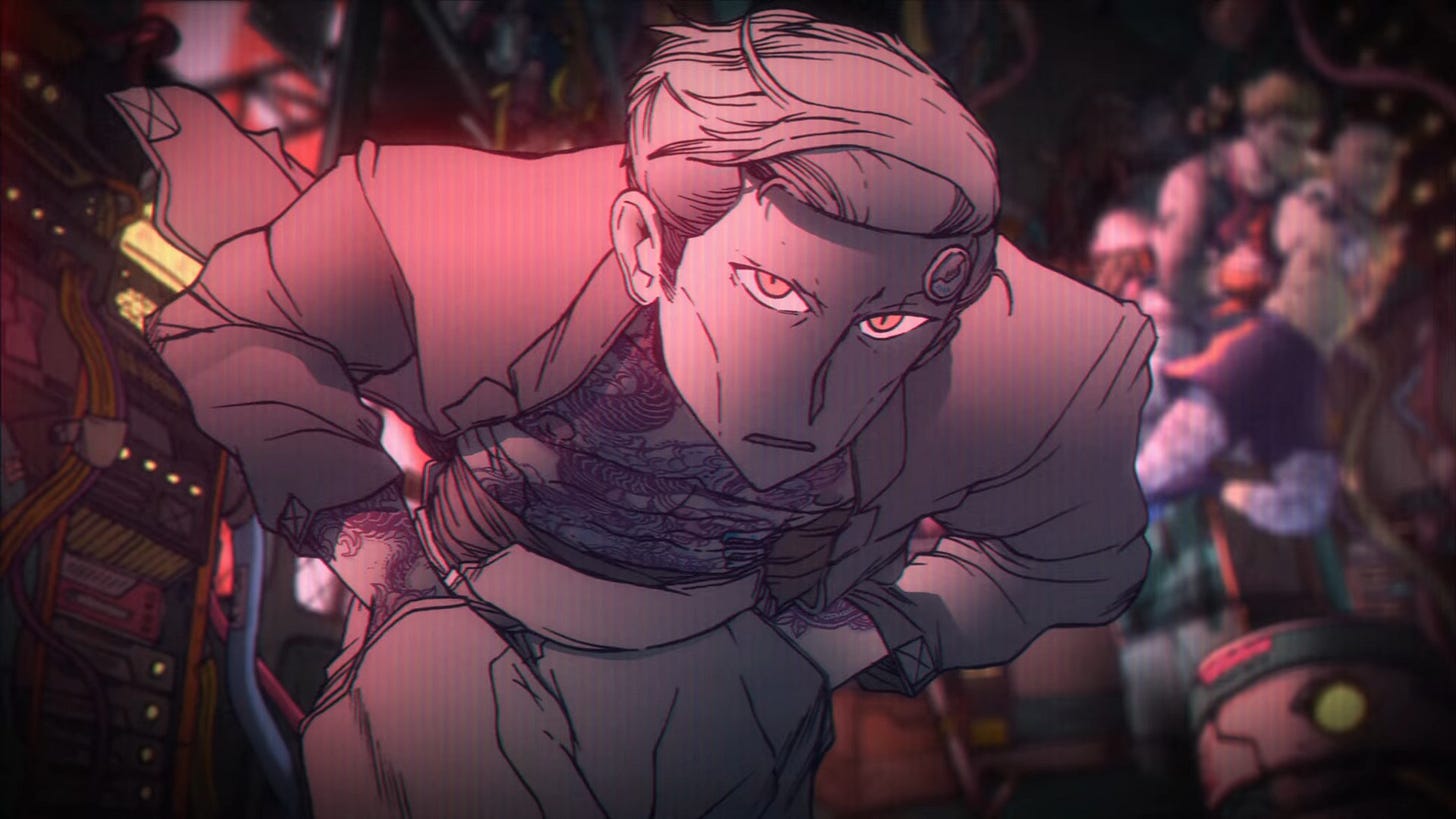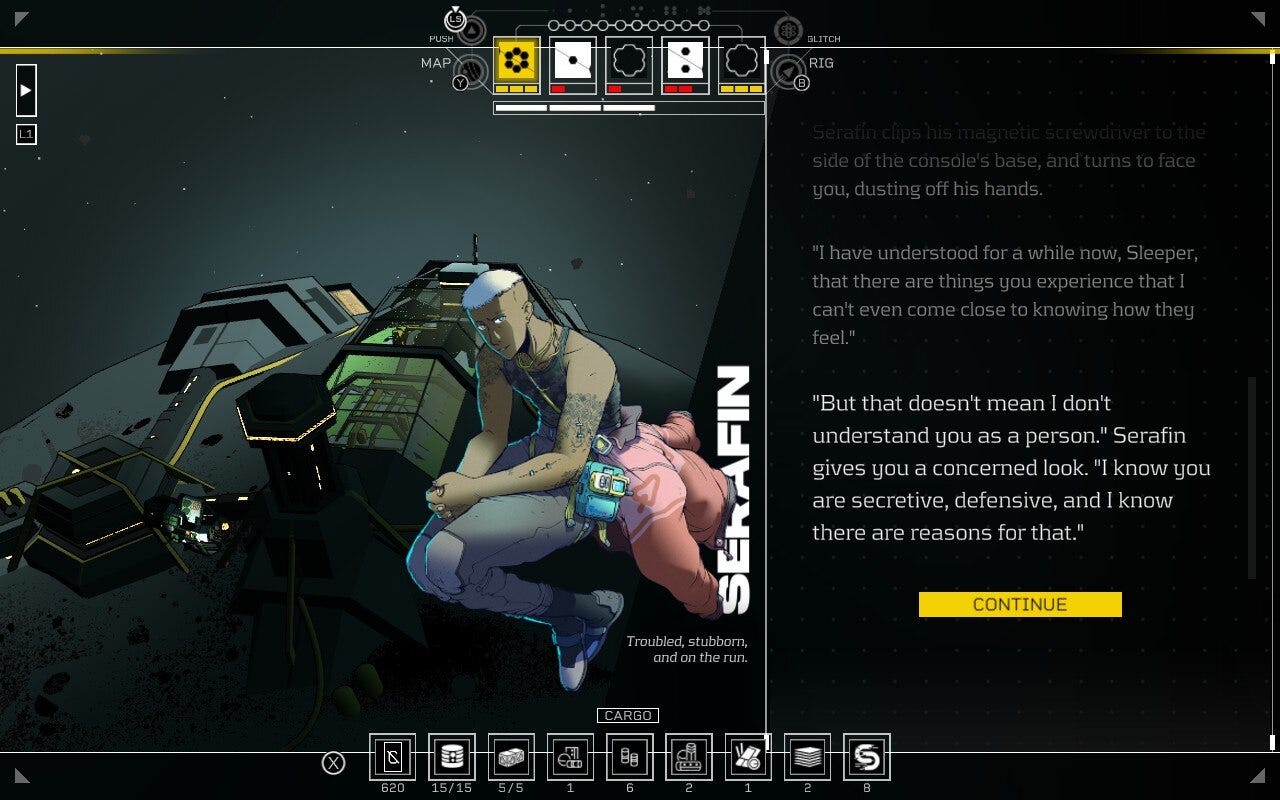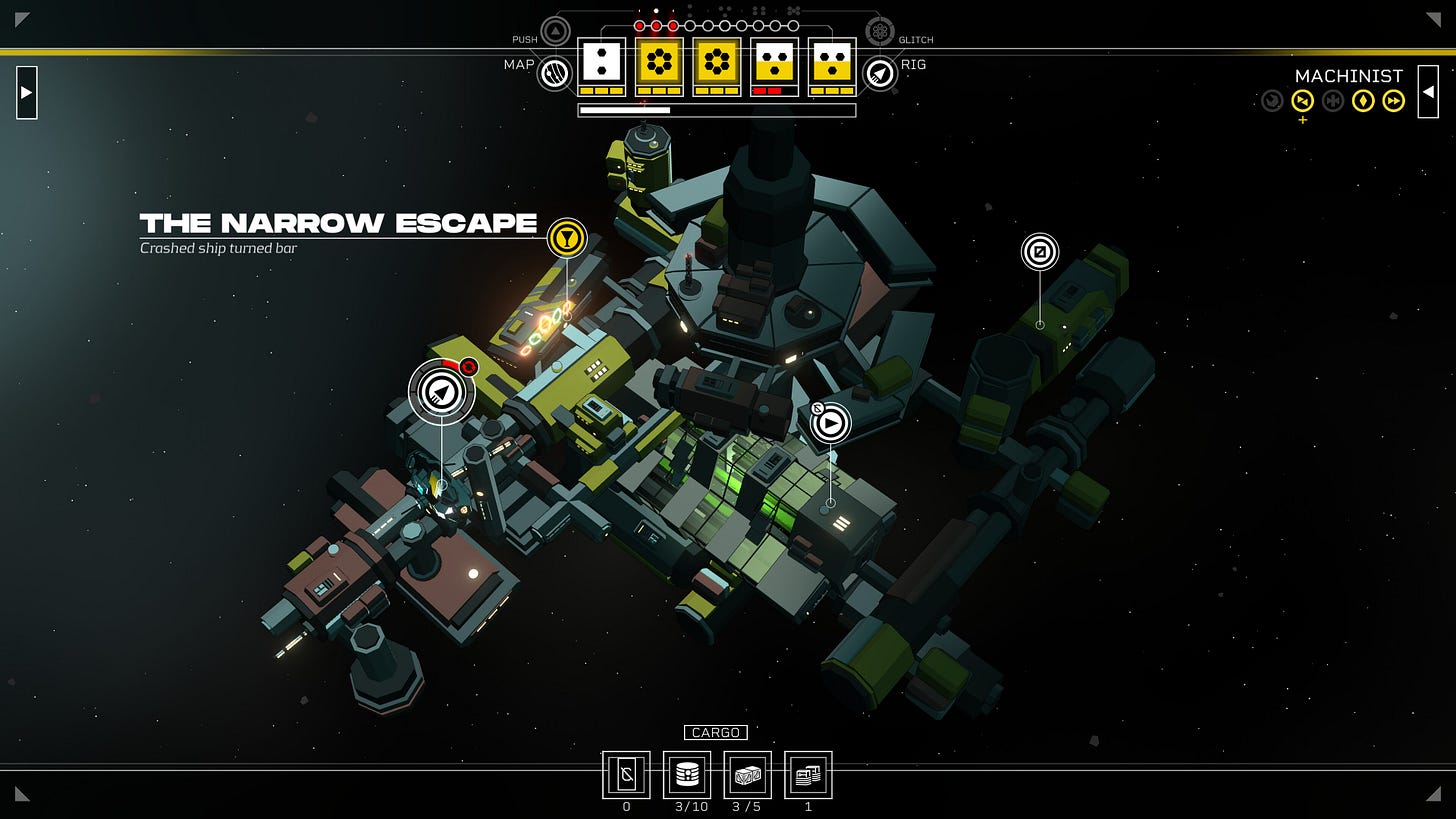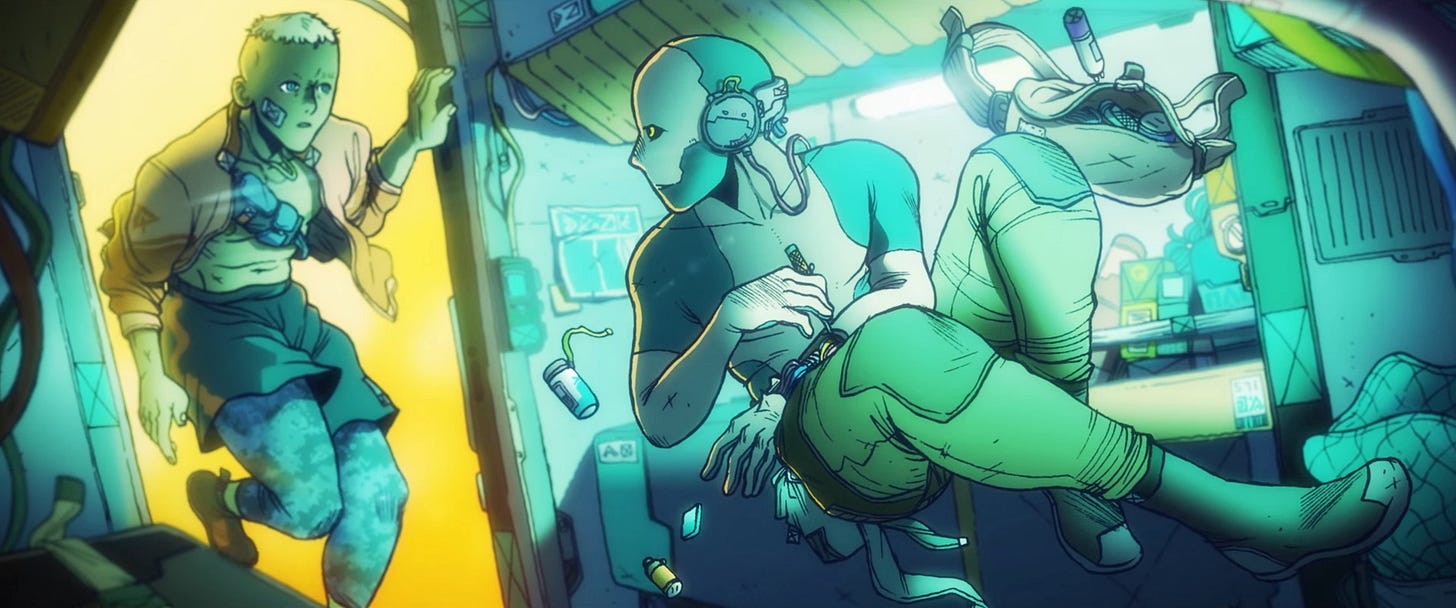Citizen Sleeper 2: Starward Vector, the sequel to one of my favorite games of 2022, launched today. Creator Gareth Damian Martin talked to me about how the game’s ideas may be even more resonant this year. Listen to the Here & Now Anytime segment or check out the NPR.org article, which I’ve sampled below:
An abandoned, powerful spaceship hides somewhere in the Starward Belt.
My contact Yu-Jin swears he can find it. I scrounge up a crew and zip to his coordinates, only to lose out to a competitor who chased us there. Exhausted and defeated, I grit my robot teeth and plan my next gig — anything to scrape together the fuel I need to evade the crime boss on my trail.
Desperation and hope intertwine in Citizen Sleeper 2, out Jan. 31. Like its acclaimed 2022 predecessor, the sci-fi video game puts you in the shoes of an android who's escaped a dystopian corporation (imagine Blade Runner, from a replicant's perspective). But despite its interstellar cyberpunk-esque setting, developer Gareth Damian Martin says the series grapples with issues close to home.
"I'm not really ever thinking about the future," Martin says. "I'm really twisting and emphasizing or making more palpable tensions that I feel in the present."
These tensions run from the global to the intimate. As an uneasy Gaza ceasefire and grinding siege in Ukraine splash across real-world headlines, Martin says that Citizen Sleeper 2 unfolds "on the shores of war." Distant battles rumble through the more immediate concerns of the game's protagonist and allies, who collaborate to scratch out lives on the margins of unchecked capitalism.
These characters range from a courier trying to outrun a brutal gang to an engineer who left their home to forge a new gender identity to another Sleeper android who’s even more damaged than you.
But as bleeding edge as its themes might be, the game’s powered by ancient gaming technology.
“Each day you roll five dice,” Martin explains. “So low rolling dice are kind of important in the game to not be something that you can easily just use efficiently – they have to be something that you kind of take a chance on.”
These digital dice force you to consider the risks of your precarious position. In Citizen Sleeper 2, Martin expanded the system to model trauma. Dice break if you get too stressed, requiring costly resources to repair.
“They'll take little scratches and nicks,” says Martin. “By the end of the game, your dice have been broken over and over again and will be shown right there on the screen as a kind of allegory for all those marks of a story that happened – the body keeps the score, I guess“
Speaking of dice, most of Martin’s answers that were too nerdy even for an NPR audience revolved around the tabletop RPGs that inspired Citizen Sleeper. As a newsletter treat, I present them here:
What were your goals with this game?
Citizen Sleeper was kind of a proposal to bring a certain kind of storytelling and a certain kind of structure into games, specifically using dice and being inspired by tabletop roleplaying games. Especially contemporary tabletop roleplaying games —not really Dungeons & Dragons and all of these older games that influenced videogames quite a lot. But to take from the newer scene and bring some of those ideas in.
It was very successful. And so it felt like walking away from it would have been a mistake because I still had so many more ideas about wanting to talk about the subject of the game, which is kind of precarity and gig work and solidarity within large and dangerous and difficult systems. Then on the other side that there's so many amazing design ideas in tabletop games that I just wanted to cherry pick and bring in with a sequel.
I'm a big fan of Blades in the Dark. But what other systems were you sort of pillaging? I was thinking of your interview with Quintin Smith where he lamented how more designers aren't doing what you're doing precisely, which is taking those ideas into digital games.
Yeah, I would love to see more of it. Blades in the Dark was the game that got me in and convinced me that there was something there that was totally different and interesting to to explore. More recently, Mothership is a super interesting science fiction tabletop RPG around creating a kind of Alien or Aliens like experience. That's a really good stress system that was kind of slightly influential on the stress system from Citizen Sleeper too.
I also love Heart: The City Beneath, which is a very strange dungeon crawler. But it has this fallout system where you gather up stress throughout the game, and then when you get enough stress, you roll against your stress and try to see what's going to happen to you. And there's a list of all kinds of strange things like you growing things out of your skin or you become haunted.
The character of the sleeper starts as a blank slate. I keep on going back to Planescape: Torment because it's my favorite of these CRPGs where you have some sort of amnesia. It also seems like that was a useful way to get new people into this world. You really don't need any background, but it also seemed like it's very possible that the original protagonist was the protagonist of Starward Vector. It doesn't have to be. But the way that you framed it meant that it's possible. Is that something you were thinking of?
Absolutely. I mean, this is always my favorite thing. Maybe it comes from running tabletop games where, at least how I run tabletop games, it's a lot of withholding information or providing little clues everywhere, all the time around things and different possibilities. Often in tabletop games, many things are simultaneously true. And it's only once the players act that things lock into place.
I think when designing Citizen Sleeper, I really wanted this same feeling of potential story, even when there isn't. I don't have the capacity to support every story eventuality that there's space for the player to fill in. So that was that idea that, ‘oh, you could connect these two in your own head canon.’
I tried to leave just enough indeterminacy in there to kind of spark a bit of inspiration. Yeah, it's super important for me and and also the sleeper generally. I didn't want to just have amnesia as a kind of given which I think is quite common in RPGs. But I actually wanted this idea of forgetting and also thinking of yourself as somehow unreliable.
Your body is unreliable, your mind is unreliable. To actually play out through the character and encourage the player to actually think about what it feels like, for example, to wake up being rescued by somebody that is claiming that this is what you've been working towards and you're good friends and you don't remember a thing about that meeting, that name. It felt like actually is a lot of a lot of emotional richness there.
A lot of gamers thirst for lore. They want answers. I feel like you're sort of resisting a tendency within gaming culture, same as you are trying to resist the expectation that you will always succeed, that you will minmax until you reach that outcome you want.
Totally. I think there's a lot of ways in which I'm trying to challenge orthodoxy within RPG design, especially because that's kind of the origin point of Citizen Sleeper. For me it was discovering tabletop RPGs and realizing what an effective storytelling tool they could be. All of these qualities that I felt had been maybe missed in the transition from tabletop to video games that happened decades before.
Only recently has it become strengthened again, like seeing Baldur's Gate 3 go back to showing a dice on the screen. Like there's a reconnection happening there. So for me it's about kind of going back and picking over qualities that I find really exciting about tabletop games and seeing like, how can we bring those into a video game? How can I encourage roleplaying?
I want the systems to support the roleplaying more so I could maybe bring in a few more players who are not familiar with tabletop and maybe don't think about roleplaying within a game, but actually the systems will pull them into an emotional state where they'll find themselves naturally thinking about these questions that you're asking about, like who's the sleeper and what's happening with these characters and what decisions should I make around this situation? What would my sleeper do in this moment?
From cerebral sci-fi to mainstream science-fantasy — I bring you to Avatar: Frontiers of Pandora. I produced an 11-minute interview between with Here & Now guest host Tiziana Dearing and game composer Pinar Toprak, who’s up for a Grammy this Sunday. I stuffed as much music as I could into the piece and recommend you give it a listen!:
“I have always been a huge Avatar fan ever since the first film,” says composer Pinar Toprak. “I just loved the world that Jim Cameron created and I loved James Horner's score.”
A veteran TV and film composer, Toprak won the gig after sending a blind demo to game publisher Ubisoft. But despite her admiration for the late James Horner, her employer wouldn’t let her adapt any of his original music.
“The challenge was, how do you create something brand new while still keeping the DNA of the score?” mused Toprak. “In the film, you may be more limited to what the film's story is telling you — but in the game, we really went beyond the Avatar sound.”
Finally, I leave you with a hat-tip to Pop Culture Happy Hour’s Linda Holmes, who wrote about The Roottrees are Dead and other mystery games!








